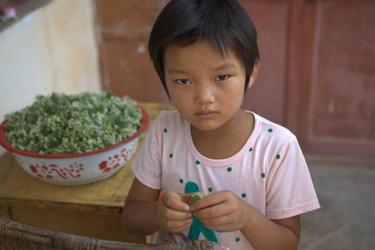
Today’s hyper-connected digital world carries new risks for children and young people, from online bullying to cyberstalking and even live-streamed child sexual abuse. But it also creates new opportunities. A new e-Learning platform and messaging tool demonstrate how technology can be used to connect and inform children and their parents, and help the voices of youth be heard.
The largest human migration in history is happening in China. Parents from rural areas are moving to cities for work, leaving their children behind. According to the latest figures from 2010, more than 61 million children have been separated from their parents. One of these children is Panpan. Her mother left when she was 1 and her father later moved to find work, leaving her with her grandfather.
Many left-behind children see their parents rarely – often only once a year at Chinese New Year. Like Panpan, some live with grandparents who find it difficult to care for young children. And those children are the lucky ones: Of the 61 million rural left-behind children in 2010, 2 million children were living alone.
Parents who move are usually trying to help their children: they often leave in search of jobs and opportunities to better support their families. But without their parents’ care and guidance, many children like Panpan are left vulnerable.
A new mobile platform aims to change that by helping parents reconnect with their families and teach their children, even if they are hundreds or thousands of miles away. The e-learning platform is a joint initiative between UNICEF and the Center for Child Rights and Corporate Social Responsibility (CCRCSR), and is hosted on one of the most widely used apps in China, with more than 700 million users globally.
Every week, the platform is updated with new animations, quizzes, cartoon lessons and more. It aims to inspire and educate workers so that they have the basic skills to deal with common parenting challenges.
Opportunity to learn
28-year-old migrant worker Guan has been following the parenting tutorials closely on this platform, learning about healthy eating and childhood diseases. She left her home in Hunan province to work in a factory and is now a 25 hour train ride away from her three young children. They were left at home with their grandparents.
Guan admits that she didn't have much chance to learn about parenting in the past. “When my children were very young, I took them to the doctor to get vaccinations. They would teach me some things about children's health, like nutrition and diet. But after that, there was little opportunity for me to learn more.”
In an age of rampant advertising, it’s easy to be confused by all the information available and not know which sources can be trusted. Faced with an overwhelming amount of information online, Guan says she is happy this platform exists to give her reliable materials.
28-year-old factory worker Zeng only goes home once a year during Chinese New Year, but she used that opportunity to teach her children what she learned from the platform: “When I was back home, l encouraged my kids to brush their teeth every day,” she said. “They also didn’t wash their hands before eating or after going to the toilet, so I taught them by example. They followed me and learned from me.”
Advice on topics like ‘Effective long distance communication’, ‘Activities to do with your children during New Year’, and ‘How to say goodbye to your child’ offer practical guidance for migrant workers on how to deal with difficult situations and build trust with their children.
Both Zeng and Guan found that good communication with both their children and the children’s grandparents was key. The platform allows them to be ‘remotely present’ to talk with their children and help guide them with potentially lifesaving information.
Listening to young people
In Indonesia, U-Report is another innovative use of technology and social media that is giving a voice to young people.
U-Report is a real-time social messaging tool that enables communication between youths and decision makers. It allows anyone from any community, anywhere in the world to speak out on issues that they care about, respond to polls, report issues on behalf of people in their country, support child rights, and respond to humanitarian emergencies.
In Indonesia, U-Report is giving young people like Fauzan Akbar a new way to engage. “I care a lot about my country and I wanted to do something to help it but I didn’t know how,” he says from his home in Jakarta. “I saw the advert for U-Report and it explained what the results could be. I think it’s a good challenge for youth. We want to take action and help, but we don’t know how.
U-Report currently operates in 22 countries with more than 2 million young people reporting on issues that matter to them most. It offers a safe space to enable people to have their voices heard, as well as to learn about issues that will impact them the most.
“We now have a platform to get our thoughts out on humanitarian issues,” said Fauzan. “Young people maybe don’t want to be in the spotlight but working as a group we can give our thoughts, it feels safer. With the right platform we can share our thoughts and feelings. It’s about how we care.”
The hyper-connected digital world carries new risks for children and young people, from online bullying to cyberstalking and even live-streamed child sexual abuse. But it also creates with new opportunities. The e-Learning platform and U-Report demonstrate how new platforms and technologies can be used to help connect and inform children and their parents, and help the voices of youth be heard, changing lives for the better.
Source: UNICEF
 FR
FR EN
EN AR
AR








